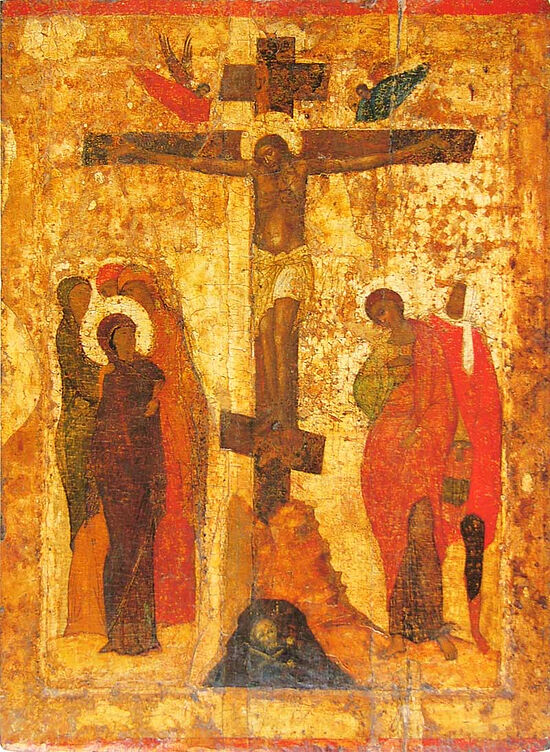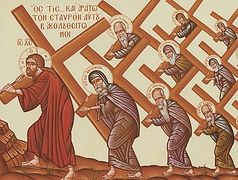These are the words of the ancient, great prophet Isaiah. These words are directed to us, your pastors, for upon us lies the duty of teaching you. Not only of showing you the path of Christ, but of showing our heartfelt love and care for you.
And I love you, the flock that God has given me, as my own close family. Don’t I know what sorrows you have, how many tears, and aren’t I obligated to comfort you?
I am trying to fulfill this obligation on this day, the great day of the Veneration of the Cross of Christ.
When we teach you the way of Christ, we always urge you to remember His words about how the narrow are gates and the straight is path which lead to the Kingdom of God; that in the world, you will have sorrows.
Sorrows are the lot of all Christians.
You ask, do only Christians sorrow? Don’t people who have rejected the way of Christ also endure various sorrows, misfortunes, and bitterness? Don’t they also shed tears?
Yes, of course, sorrows are unavoidable for them also. But in God’s eyes there is a great difference in value between our sorrows and tears, and the sorrows and tears of those who live without God. They do not endure their sorrows voluntarily, but only because they can’t get rid of them in any way. They often endure sorrows with curses and murmuring, but we Christians should bear our sorrows—which are connected with the name of Christ—in a completely different way, with utter submission to God’s will, and with gratitude to God for everything that happens to us. Gratitude for the good, the difficult, the bitter, and for all our sorrows.
We bear our sorrows voluntarily, for if we were to renounce Christ, we would be free of the majority of our sorrows. But since we do not renounce Him, we bear them voluntarily, and God blesses us for our suffering. For great is the value of our suffering and tears in God’s eyes.
You know how worldly people strive to be rid of sorrows: They drown their grief and sorrows in wine and vodka, or stupefy themselves with tobacco and even drugs.
But is this worthy of us Christians? Isn’t the voice of our conscience lulled to the greatest degree by wine and tobacco? Oh, this is deeply, deeply unworthy, and God forbid that anyone of you ever sink to using these means of silencing the conscience that are so repugnant to God.
Worldly people seek consolation in their sorrows, and when they find it, they try to forget about them. They seek entertainment, go to parties, visit each other’s homes, and engage in empty chatter.
Let that never be so with us, for a Christian should not stifle the voice of his conscience, but to the contrary should carefully heed it.
They seek to stifle their sorrows by friendships; in the ancient world, friendship was highly valued. But don’t you know how unreliable human support is as opposed to God’s?
People of higher spiritual status seek to forget their sorrows and sufferings in intense labor, in their work. This means of easing sorrows is of course immeasurably higher than muffling them with wine, entertainment, dances, and parties. Labor muffles sorrow for a time, but you cannot work without interruptions, because once the work is done the voice of the conscience will reproach you once more, and heavy sorrows rise up again. You won’t achieve the desired effect through labors.
The highest thing in which people find relief is mutual love—love of spouses, love of parents for children, love of people who are worthy of love.
All love is blessed, and this love is also blessed. But this is the beginning, lowest form of love. From marital love, by learning through it, we must rise to a much higher love for all people, for all the misfortunate, all the suffering. From this love we rise to a third level of love—divine love, love of God Himself. You see, until people have reached love for all, divine love, their love for only their family and friends is not of great significance.
Those who seek consolation in sorrows in the wrong places will never find it in anything.
Where then can we find consolation in sorrows? The prophet David talks about this: In God alone does my soul find rest. In God, in God, in God’s law did he find consolation. And he is not alone in this—all the righteous ones of the Old Testament found it in this, for then people who did not know Christ (for He had not yet come into the world), found deep comfort in their grief from a heart that ran to prayer, in this spiritual communion with God.
Blessed are they, blessed are these Old Testament righteous ones, but immeasurably more blessed are those who have come to know Christ, who are learned in Christ’s law, who have chosen the path of Christ. Blessed are they to whom the highest form of consolation is accessible—consolation by Christ Himself. For isn’t this consolation hidden in the cross of Christ the most profound and eternal consolation?
Tell me—if you bear in your heart the cross of Christ, if you often gaze at least with the eye of your mind at Him Crucified on the Cross, doesn’t it produce a very deep impression, a profound movement in your heart? For, what do we see when we gaze upon the Cross of Christ?
We see the Son of God, the Second Person of the Holy Trinity, God made man, the Holy of Holies, the Great Righteous One, the Benefactor of the human race, far surpassing anything the world has ever seen or ever will see. We see Him nailed with iron nails to the Cross. We see Him suffering terribly—Him, Who with but the wave of His hand, with one word commanded the waves and the wind to cease; Him, Who in the course of His brief life on earth worked amazing miracles—miracles required by His love, His pity for people. We see hanging on the Cross Him, Who healed all diseases, who opened the eyes of the blind, raised the paralytics from their beds; Who fed thousands of people with a but a few loaves of bread; Who raised the dead. We see a great Benefactor, Savior, and Deliverer from the power of the devil. The Cross of Christ is terrible, for Christ’s ensign casts out demons, which flee in terror and confusion, because from the Cross of Christ an immeasurable stream of love has poured forth—love that destroys the evil and enmity of the devil and his demons.
So, if we see on the Cross the Deliverer of the world Who takes away our sins, having become a sacrifice for all of us the wicked, then what are our sorrows, no matter how many, no matter how heavy? What are they compared to the teardrops that streamed down His divine cheeks, or the stream of blood that flowed from His side pierced by the spear and reddened His Cross? What are all our sorrows, compared to this?
And when you are penetrated with these thoughts and feelings, when you look upon the Cross of Christ with all your trembling heart, only then will you receive true—the only true— consolation.
Why then do we need any other consolation, if we have been given this greatest of all consolations! After all, we have been given the Cross, which you now see raised up before you, and which we give you to kiss. Isn’t this the highest form of consolation? Don’t we continually draw enormous strength from this source of consolation? Holy Scripture is full of this consolation—only draw from it, only turn to Holy Scripture, to the Cross of Christ; and then you will receive the only true and eternal consolation.
Read carefully the words of the apostle Paul and remember them: Blessed be God, even the Father of our Lord Jesus Christ, the Father of mercies, and the God of all comfort; Who comforteth us in all our tribulation, that we may be able to comfort them which are in any trouble, by the comfort wherewith we ourselves are comforted of God (2 Cor. 1:3–4).
I can testify to this. I testify with all my heart to you the profound truth of St. Paul’s words, I testify from my own experience, for the Lord comforted me in my great sorrow.
I can say that to the measure of the multiplication of your sorrows in Christ, will your consolation in Christ multiply. Remember, please remember: The greater your sorrows, the greater will be you consolation.
Only Christ can console us, we will seek consolation only in Him, only in the Cross of Christ will we route out faintheartedness, sorrow, and murmuring.
This is why the Cross of Christ is brought out for you on this holy day, in order to draw you all to Him, to the One Who was crucified on the Cross. With great joy we see how crowd after crowd of people hasten to see the exalted cross and hear the hymn, “Before Thy Cross, we bow down, O Master.”
What power draws us here? Why are there so many people in God’s church? The invisible power of God draws you, the power of Christ draws you in order to console you, to wipe away your tears. And if this is so, then who are we, weak and sinful, to try to add anything to this consolation? Not unto us, not unto us… But may God Himself direct your hearts in divine love and Christlike patience.
Amen.




